The story of a Ukrainian reconnaissance officer who crawled for three days and two nights
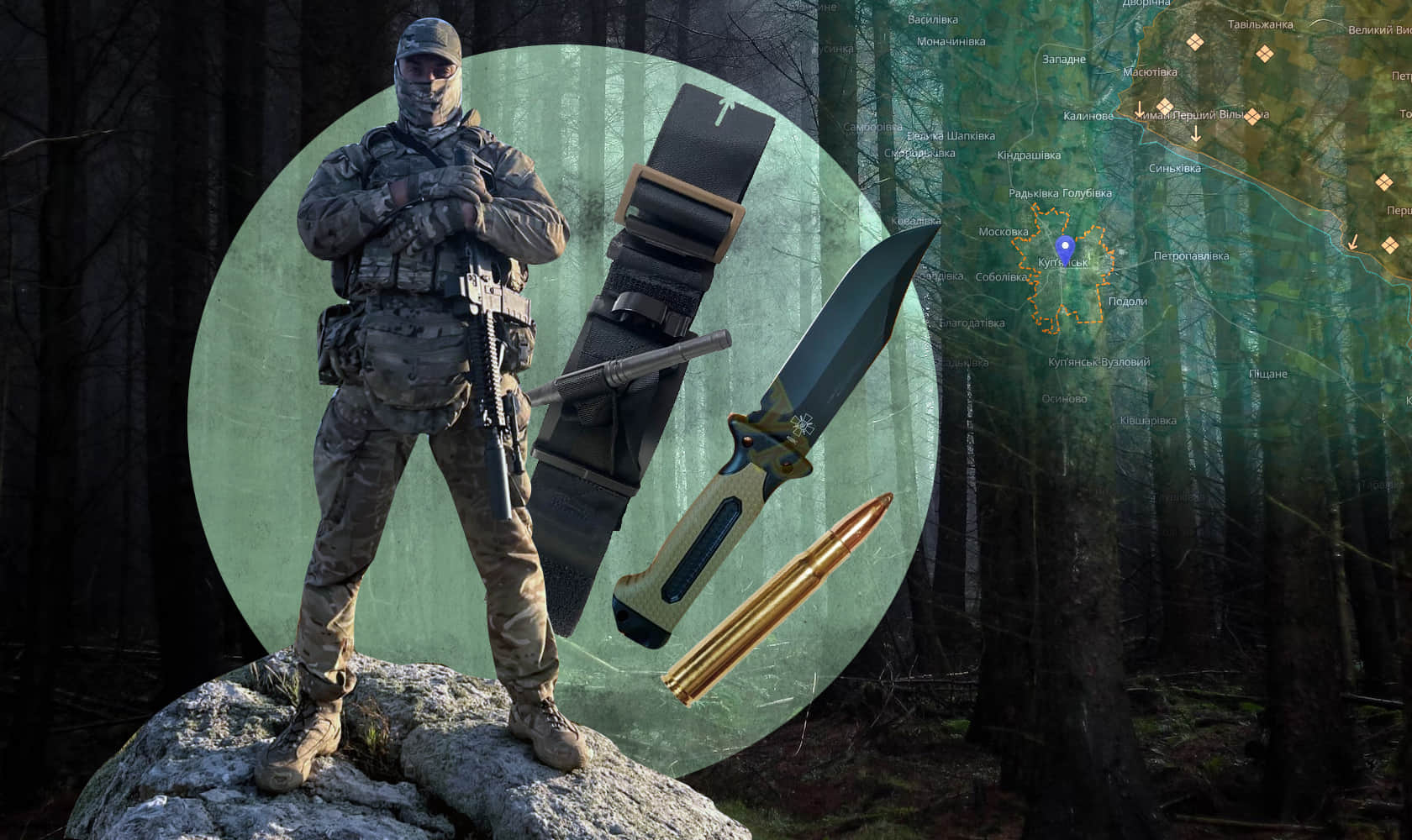
In September, Ukrainska Pravda told the story of Conan, a soldier belonging to Artan (a special unit of Ukraine’s Defence Intelligence) who fell overboard during an operation in the Black Sea and had to swim for 14 hours.
Another Artan soldier, who goes by the alias "Khokhol", remembered Conan’s story at the moment when his strength deserted him and he was tempted to give up the fight.
In October of this year, while on one of the special unit’s operations on the Kupiansk front, Khokhol found himself in a forest in the Russian rear, right in the middle of enemy positions. Alone, without food, water, a watch or a compass. Only an assault rifle, two magazines of bullets, a knife, and an icon. And one bullet reserved for himself.
He couldn’t walk – that would mean certain death. All he could do was crawl very slowly, tightly pressed to the ground so that the enemy wouldn’t notice any movement.
Khokhol’s fellow soldiers had already decided that he’d been killed and had sworn to avenge him. His wife had arranged a burial plot in the cemetery and got candles ready.
But he was crawling. And he crawled for three days and two nights.
"If a person had nine lives, then I used up all nine on that journey," he says.
This is a story about invincibility. About a struggle against thirst, despair and deadly fatigue from which he eventually emerged victorious. It’s a love story too.
This is the story, told in his own words, of Khokhol, the special agent who, when things got tough, just kept on crawling.
Son of Heaven
Where to start? Should I start with the pirates?
Until 2019, my job was escorting non-passenger vessels like tankers. We’d join the crew just as they were about to enter the pirate danger zone. I sailed around Africa twice. Malaysia, Madagascar, the Canary Islands, Sri Lanka... I know them all.
But when it came to pirates, I was unlucky. I didn't see a single one.
As you can see from my identification patch, my alias is Khokhol. So back in 2001, a close friend of mine from Odesa used to call me that. And when the question of what my alias would be came up, I remembered that. I don't see anything offensive about it. ["Khokhol" is a derogatory Russian term for Ukrainians – ed.] Apparently Khokhol means "Son of Heaven" [kök oğlu means "son of heaven" in Crimean Tatar – UP].
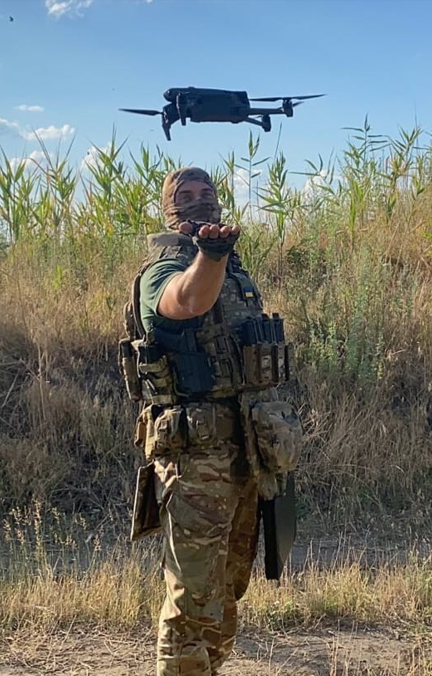
During the first month of the full-scale war, I helped my friends here in Kyiv with logistics. And when the Artan unit was formed, I was one of its original members.
Our first mission was Enerhodar. We tried to enter the city, but it didn't work out as planned. Then Kharkiv. In Bakhmut, we helped out where the Armed Forces’ positions were sagging.
I was at Zmiinyi (Snake) Island as well – I was among those who held onto it [after it was liberated – UP]. The island, the sea, the sunsets, the salt – it's beautiful. If the Russians had remained on Zmiinyi and the gas drilling platforms where they set up their equipment, they would have controlled almost the entire south. So we went in and took it.
And finally Kupiansk, where this whole story took place.
"The plan was simple, no hint of trouble ahead"
Kraken [a special unit of Ukraine’s Defence Intelligence – UP] needed some help, and the leadership decided that our unit could join them, as we’d just finished an operation at sea. I got a platoon of 28 people together. We got the weapons, night vision devices and all the equipment together, and set off.
We were to replace them in six positions, and 28 men were enough for that.
On Monday evening, we stepped in, replaced the men, and started work. As soon as dawn broke the next morning, things got underway.
The fighting was a bit more intense than usual. As the remaining Kraken fighter put it: "You hit the jackpot today." A tank was firing on our flanks, and they destroyed the right and the left flanks. There was one dead man on each flank, and a lot of concussions.
Read more: Kraken attacks: the story of the Defence Intelligence unit that the Russians have demonised
Just so you understand: by the evening, 21 of the 28 men in the positions had to be replaced: two had been killed, eight were wounded, and eleven had concussion.
One enemy group got in between our two positions and were basically working in 360 degrees. There weren’t many of them, but they still kept us on our toes and forced us to be distracted by them. There was long grass in the field – they’d crawl out and shoot, but you wouldn't see them.
The only people left from the original team were six of Mars’s people [Mars was one of the special forces soldiers – UP] and me. Mars had captured several enemy soldiers during the day. So we said to one of them: "Go back to your lot and tell them to surrender." And he went and told them about our offer. If they’d all been rank-and-file, they would have agreed, but the platoon commander was there, and he said no.
However, when that Russian was walking back and talking to them, our drones noted where their positions were and how many of them there were. And then we shelled them during the day.
I contacted the headquarters and said: "There are several options, but I suggest storming the forest plantation between our positions by night and knocking them out." They said they were working on it and told me to wait for the group.
The group arrived that evening, led by Korol [an alias meaning King – UP], and I asked him: "Were there any instructions about me?" He said "No." I hadn’t been ordered not to take part in the assault, so as company commander, I decided to go with them.
Why did I decide to go? Viktor [Torkotiuk, the commander of Artan - UP] asked me that question later too. How could I do otherwise? These were my people. This was my group.
So we decided that I’d take the prisoners and two of Mars’s fighters – Nevskyi and Lvovskyi – and we’d head towards the reserve. Then we’d hand over the prisoners to part of the group, take the core of the reserve, go back, and arrange them on the road in all positions. Then we’d go back to Mars, collect him and the rest of the group, and proceed with the evacuation.
The plan was simple and straightforward, and there was no hint of any trouble ahead.
"Then I realised it was the enemy!"
It so happened that all our night vision devices and thermal imagers had already lost quite a lot of charge. Our drones were recharging too, so there were no "birds" above us either. Well, the three of us were about to be squeezed like lemons.
Also, the prisoners had their hands tied and were stumbling as they walked. I decided to untie them, but I warned them: any step to the right or jumping around, and we’d shoot on sight.
Somewhere near a fork in the road, the prisoners fell over; we picked them up and put them back together. Some of them were wounded, and we gave them a hand.
It was slow going. I went first. Behind me were the six prisoners. And Nevskyi and Lvovskyi brought up the rear.
We kept walking, unaware that we’d gone the wrong way at the fork and weren’t going straight on, but were walking towards enemy positions.
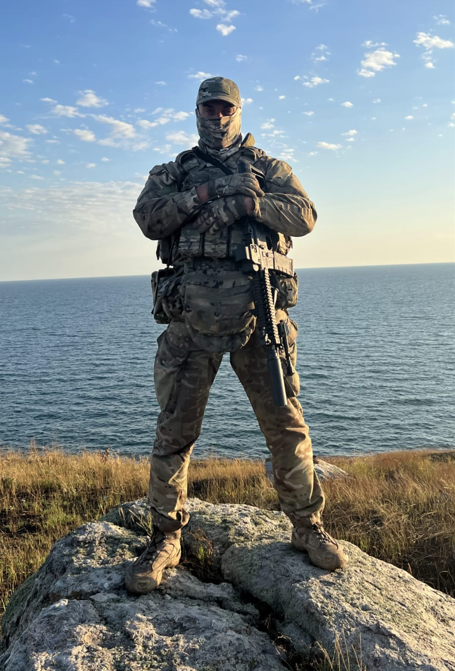
We walked about 700 metres [just under half a mile]. Three guys came out of the forest to meet us. We were walking quietly. I was silent, and my fighters were silent, and the prisoners were chattering amongst themselves in their native language. And these three guys said: "Password!"
"What do you mean, password?" Nevskyi said. "We’re with Khokhol."
"Who’s Khokhol? What are you on about?"
And then I realised it was the enemy! I shouted "Contact!" into the radio and opened fire on those three guys.
The Russians had an observation point there. A battle began. There was machine gun fire. They realised what was happening and got help. They started throwing grenades at us, and they killed the prisoners who were in the middle.
I had eleven full magazines. When I got out of there, just so you know, I had two and a half left. I shouted "Get out of here!" to the boys.
I had a plan. I thought: I’ll move to the right and start shooting back, and those two should keep quiet. Then all the attention will be on me. And I’ll roll back to the starting position, where there’ll be a corridor I might be able to go along.
The plan was a good one, but it didn't work out. I’d just started to retreat when help came to them [the Russians – UP]. They started throwing hand grenades at me, and I got well out of the way, where they couldn't reach me.
I moved about 50 metres away, but they got to me with some VOG rocket-propelled grenades [fragmentation ammunition from an under-barrel grenade launcher – UP]. There was an explosion nearby, and I lost consciousness. Now I realise that the reason no one went near me was because I was in a minefield.
Morning in a minefield
I was woken up the next morning by explosions. The Russians were dropping bombs from a drone on places where I might be, and they were also trying to get me with a grenade launcher. They couldn’t see me because of the long grass, but they knew I was hiding somewhere.
It was about seven in the morning. I wasn’t wearing any body armour, as I’d taken it off when it was getting in the way of my retreat. One of the VOG grenades had broken my headset. When I came to, I took off my helmet and shoulder belt system.
I realised I had three options. Surrender, stay put, or get out of there.
I couldn’t head straight for my guys, because that would make us easy targets for the Russians. And my guys wouldn’t have let me through either, as they didn’t know what had happened to me, and I’d left the radio somewhere. I thought I’d get as close as possible to our positions, work out where they were, and go between them, hoping that I wouldn’t be detected by any devices.
So I set off.
I took two magazines with me, a tourniquet, a knife, and my icon – nothing else. I took the tourniquet for the following reasons: if I got one limb wound, I’d put it on. And if I got a second one, I’d take it off and bleed to death, because I didn’t think I’d survive. And I brought one bullet for myself, just in case.
An enemy drone started to follow me. And I gestured to it, asking: which way should I go? It waved its wing to me, pointing me in some direction. Yeah, that meant I needed to go in the opposite direction.
I went down the hill. I saw that it was all covered with Butterfly Mines. And there were tripwires as well. But I was worried about one thing – stepping on a landmine that might be hidden. So I tried to step where the grass was growing.
I came to a hollow and saw that it was all covered with tripwires too. And there were some pretty large anti-personnel fragmentation mines. They work at 50 metres. They were on tripwires, and copper wire had been used for the tripwire. There was dew on it that morning, so you could see the wire. I realised that these fragmentation mines were everywhere, so I went in the other direction.
The drone was lagging behind, and I realised I had a chance to hide from it. I walked a bit further, crawled under a bush, and covered myself with leaves. I could hear the drone buzzing, looking for me.
I stayed there until dusk. Then I got going again. I crossed a field road, and then I had to crawl.
And I crawled for three days and two nights.
I remembered Conan and thought: he kept on swimming, so I'll keep on crawling
During that time, I crawled on my stomach, without getting up, for about three and a half kilometres (2¼ miles). I should thank the American equipment, as it helped a lot. It's Gore-Tex – it doesn't let moisture in, but it's "breathable".
On the way, I ran into a sniper. I’d started to crawl fast and my body had warmed up, and he was able to see me through the device. It wasn’t necessarily an enemy sniper, by the way – it could have been one of ours. A bullet whizzed over my head. I stopped, and another one landed literally a metre away.
In general, there are different ways you can crawl, but in my case, I had to keep as close to the ground as possible and do everything very slowly and inconspicuously. This is the technique: you crawl, say, 10 metres, then you rest, recover your breathing and restore your body temperature. When you get chilly, that's your signal to go on crawling.
There was no water and no food.
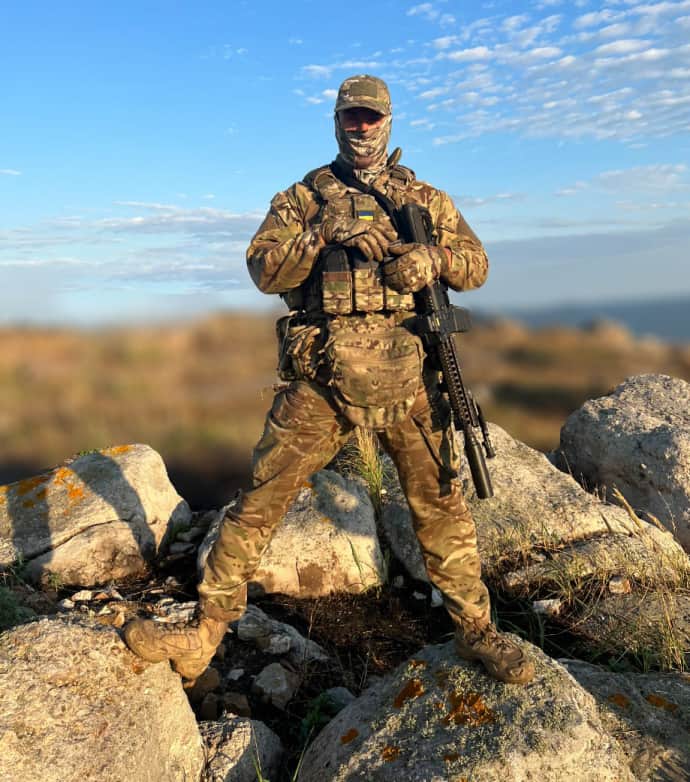
On the second day, the weather was rainy and foggy, and there were no reference points that I could see. I could only tell that our guys were around somewhere by the sound of guns whenever a Browning M2 machine gun started up.
When I needed to sleep a bit, I’d arrange a place in the grass where it was drier, and put whatever firewood under me that I could find. After the second night, I realised that I was losing strength and that my time was limited.
I even started having hallucinations: for instance, I was talking to my wife while I was crawling. I realised then that I was delirious. I lost my sense of direction, I just got lost and didn't know where I was going.
It felt like you were on another planet. Day after day, it was always the same: a little lighter, then a little darker. Grass, fog, and rain. And it's probably good that the weather was like that, because I knew that a drone could have found me anytime.
At moments like this, you start to reassess everything, and you realise that everything material is worthless. I thought a lot about my second wife, who I married in 2019. I remembered my children. I felt that I still had a lot of unfinished business. I remembered Conan and thought: he kept on swimming right to the end, so I’m going to keep on crawling too.
There was another time when I was running out of reasons to keep crawling. I thought: "F**k, am I going to give up my life here on the ground? I'd rather crawl there, and if they [the enemy] are there, I'll just take someone else with me."
But I had no thought of surrender.
The Bakhmut icon
As I mentioned, I also had an icon with me.
It appeared to me when we were stationed in Bakhmut, in a residential area. I was in a house at a position near a window. And there was a cloth icon hanging on the wall, an embroidered Virgin Mary. I used to look at it, and sometimes I’d talk to it in a jokey way.
Then a mortar attack started. A mortar bomb hit the house. Two corners and the roof of my building collapsed. I pressed myself against another corner, and the icon fell onto my chest. I said: "Do you want to come with me?" I took it out of the frame and rolled it up, and I’ve worn it in my armour, on my back, ever since.
And there was another incident (I had the icon with me by then): enemy tanks were approaching us, so we started to retreat through a mined area. My brother-in-arms hit a mine, and I stepped on a Butterfly Mine as well. My boot was blown to bits, and I had a bruise on my heel. I was marked as Cargo 300 [the code name for wounded soldiers – ed.] as if I had no leg, but in fact, if you don't look too closely, I don't even limp. Someone saved me.
And this time, when we were going in the wrong direction and I threw off my body armour, I realised as I was walking away that the icon was still in my armour. I ran back with bullets whistling around me, but I got the icon and took it with me.
I don't believe in an old man with a beard sitting on a throne; I believe in some places where people have prayed a lot. I believe that everything happens for a reason.
"Guys, I'm coming over to you. I'm one of you!"
At some point, I reached the enemy positions. I waited for a long time – I was so close that I could hear all their conversations. But finally, I managed to sneak past between two of their positions.
It was hard, as the area was only 12 metres wide, so I spent four hours crawling through, trying not to give myself away by any movement, so I wouldn’t be noticed or detected by any devices.
I reached the outskirts of the village of Ivanivka, where there was a cemetery and some trenches. I found half a bottle of water. I had to take tiny sips, holding the water in my mouth. I realised that if I drank it all at once, I’d be a goner.
There in the graveyard, after my long crawl, I got to my feet and walked a little. Once I got up, I realised I’d forgotten how to walk. And the fighting was still going on around me, with machine guns and mortars firing.
Then I saw some military positions. I looked closely and saw guys in pixel camouflage – they were our guys! I dropped my rifle, raised my hands and said: "Guys, I'm unarmed, I'm coming over to you, I’m one of you!"
They gave me a ration pack and I tried to eat, but I didn't manage to do it very well. I hadn't eaten for so long – I’d tried to chew ears of grain in the field and collect water from the weeds, but it was useless.
And then the guys explained about the road near Ivanivka: one side was being attacked by us and the other by the enemy. I decided to walk along the road, running from bush to bush, because I just couldn’t crawl any more.
"My story is about not giving up"
Eventually I came to our positions, where the mortars were. I was taken to the nearest checkpoint. There I explained that I didn't know the password, I had no documents, my alias was Khokhol, and I needed to speak to the commander of the Kupiansk garrison.
And within literally half an hour the chief of staff himself rushed over, and I was picked up and taken to the command post.
When they found me, the doctor said: "You had 12-14 hours to live." My blood pressure was 60 over 80. They took me to a stabilisation point, and I passed out. They wanted to put me on an IV, but there was nowhere to put it.
Recovery wasn’t easy. First I had to undergo medical treatment and surgery because my eardrum had been perforated and there were little bits of shrapnel still in my body.
When I eat, I still have no sense of whether I'm full or not. I never feel full. So I eat the same portions as I did before, according to the schedule. And it's the same with water – I just have to pour it in. I feel like a sponge.
And at night, for a long time, I still felt like I was in the Kupiansk forest. I’d close my eyes and watch this movie playing in my head.
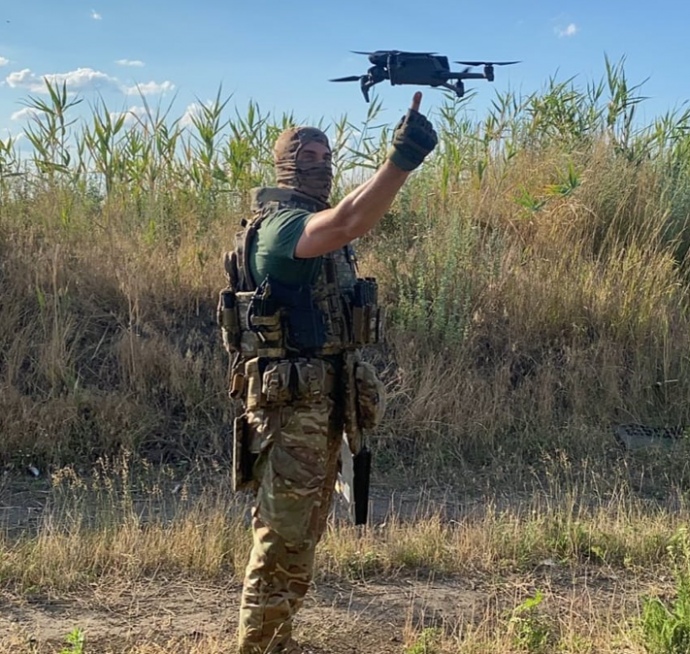
My story is about not giving up. As Vitia, aka Tytan [Viktor Torkotiuk – ed.], says, we came here to destroy the enemy, not to die.
There’s no need to mindlessly sacrifice yourself – we value every life. I hope that by my example, I can give people hope and confidence that things are not so bad.
And another good thing – Nevskyi and Lvovskyi, who were with me, managed to get out. Wounded and concussed, but alive.
"My wife had arranged my plot at the cemetery"
My wife is my first love. We met when she was 15 and I was 16. But we were young and we didn't really understand each other, so we broke up. I went to do my military service and ended up in Odesa; she went on to further education and ended up in Kyiv. So I settled down and had a family in Odesa for 13 years, and she raised her family in Kyiv for 17 years. We hardly ever got in touch.
But then she got divorced, and so did I. When I was leaving for my last trip, she came to see me off, and then we talked constantly during the whole trip. That's when it became clear that we were going to be together. We got married in 2019.
When I go on a combat mission, I don't take my phone with me. I warn my wife that I'll be uncontactable for a certain period of time. And this time, I hadn’t been in touch for a long time. So my wife started calling my fellow soldiers and commanders.
They flew a drone over, saw a dead soldier who looked like me and thought he was me. They even wanted to exchange three or five live Russians for my body.
They went to her house and told her all this. She asked if it was 100% certain that I was dead, and they said 99%. They said they were negotiating an exchange for the body.
So my wife made arrangements for a burial plot at the cemetery and got candles ready.
So when I showed up at the command post alive, someone shouted: "Get this guy a phone, he has to call his wife, she's going crazy!"
That’s the kind of unit we have, you see – even our wives know each other. We talk to each other and meet up together – it's really friendly, like family.
Finally someone called her. I remember the conversation word for word. I picked up the phone and said to her:
"I'm sorry it took me so long to crawl to you."
Rustem Khalilov and Yaroslav Shevchenko
Translated by Yelyzaveta Khodatska and Myroslava Zavadska
Edited by Teresa Pearce